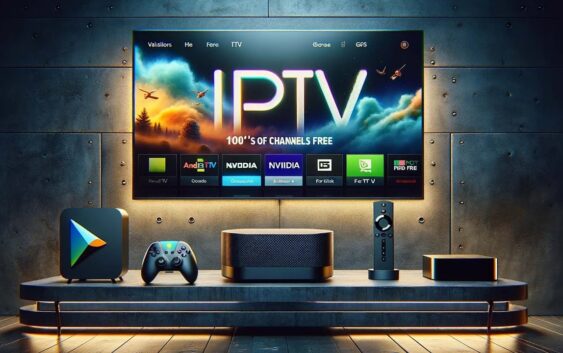- Slot Machines: Spinning Luck into Excitement
- The Fascinating World of Slot Games: History, Evolution, and Modern Trends
- Slot Games: From Mechanical Reels to Digital Entertainment Powerhouses
- Slot Games: History, Evolution, and the Thrill of Chance
- The Fascinating World of Slot Games: History, Evolution, and Modern Appeal
Understanding IPTV: The Future of Television Streaming

The way we consume television content has transformed abonnement iptv dramatically over the past decade, with traditional broadcasting methods being challenged by digital innovation. One of the most significant developments in this space is Internet Protocol Television (IPTV). Unlike conventional cable or satellite services, IPTV delivers television content via the internet, offering users an on-demand and highly customizable viewing experience. This article delves into the world of IPTV, exploring its benefits, challenges, and potential impact on the future of television.
What is IPTV?
IPTV stands for Internet Protocol Television, a system where television services are delivered using the internet protocol suite over a packet-switched network like the internet, instead of being delivered through traditional terrestrial, satellite, or cable television formats. IPTV allows users to stream media continuously, making it possible to start watching a show or movie before the entire file has been transmitted.
How IPTV Works
IPTV works by converting television signals into packets of data that are transmitted over the internet. This process is similar to how other types of data are sent over the web, such as emails or web pages. IPTV can be delivered through a variety of technologies, including:
- Live Television: Streaming live TV broadcasts in real-time, similar to traditional TV.
- Video on Demand (VOD): Allows users to select and watch video content whenever they choose, rather than at a scheduled broadcast time.
- Time-Shifted Media: This feature lets users watch television programs after they’ve been broadcast, allowing them to “rewind” to earlier broadcasts. A common example of this is the ability to replay a sports event after it has aired.
Advantages of IPTV
- Customization and Interactivity: One of the primary benefits of IPTV is its interactivity. Unlike traditional TV, where viewers have to stick to scheduled programming, IPTV allows users to choose what they want to watch and when they want to watch it. This level of customization extends to various aspects of the viewing experience, including selecting different camera angles, accessing extra information, and even interacting with other viewers in real time.
- On-Demand Content: IPTV’s on-demand nature is another significant advantage. Users are not limited by broadcasting schedules, enabling them to access a vast library of content at any time. This is especially appealing in an era where binge-watching and time-shifted viewing have become the norm.
- Higher Quality Streaming: With the advancement in internet speeds and compression technologies, IPTV can offer high-definition streaming, providing viewers with better quality video than traditional broadcast methods.
- Multi-Device Compatibility: IPTV is not confined to a television screen. It can be accessed on various devices, including smartphones, tablets, and computers, making it convenient for users to watch their favorite content anywhere, anytime.
- Personalized Content: IPTV platforms can offer personalized content recommendations based on viewing habits, making the experience more engaging and tailored to individual preferences.
Challenges Facing IPTV
While IPTV offers numerous benefits, it is not without its challenges:
- Bandwidth Requirements: High-quality IPTV streaming requires a significant amount of bandwidth. Users with slower internet connections may experience buffering, reduced quality, or even complete service interruptions.
- Content Licensing and Piracy: Ensuring that content is properly licensed for IPTV distribution is a complex issue. Moreover, IPTV’s reliance on internet delivery makes it more vulnerable to piracy, which is a significant concern for content creators and distributors.
- Technical Issues: IPTV services depend heavily on the internet infrastructure. Network congestion, server downtime, or other technical issues can disrupt the viewing experience, something that is less of a concern with traditional broadcasting methods.
- Regulatory Hurdles: IPTV operates in a regulatory gray area in many regions, where rules designed for traditional broadcasters do not necessarily apply. This can lead to complications regarding content distribution rights, advertising regulations, and consumer protection laws.
The Future of IPTV
As internet speeds continue to improve and more content becomes available online, the popularity of IPTV is likely to grow. The flexibility, convenience, and personalized experience offered by IPTV align well with the viewing habits of modern consumers. Furthermore, advancements in technology, such as 5G, are expected to reduce some of the current limitations related to bandwidth and connectivity.
In the future, IPTV may further integrate with emerging technologies like virtual reality (VR) and augmented reality (AR), offering immersive viewing experiences that go beyond traditional TV. The rise of smart homes could also play a role in how IPTV evolves, with seamless integration across multiple devices and platforms becoming a standard feature.
Conclusion
IPTV represents a significant shift in how we consume television content, offering a more flexible and personalized viewing experience. While it faces certain challenges, the potential for innovation in this space is vast. As technology continues to evolve, IPTV is poised to become a dominant force in the television industry, shaping the future of how we watch, interact with, and experience media.
